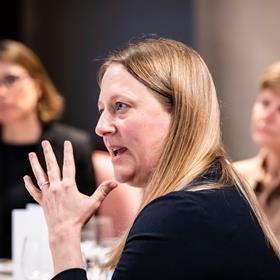Last year was a successful year for many parts of the property industry, which saw record-breaking deals for the office, logistics and residential markets.

Panel of experts
Melanie Leech, chief executive, BPF
Kate Bedson, senior director, national logistics, SEGRO
Patricia Brown, director, Central
Alice Dockar, partner, Freeths
Olivia Harris, chief executive, Dolphin Living
Kaela Fenn-Smith, managing director, ESG consultancy and sustainability services, CBRE
Félicie Krikler, director, Assael Architecture
Jackie Sadek, chief operating officer, UK Regeneration
Jessica Tomlinson, managing director, head of London real estate, Barclays
Liz Hamson, editor, Property Week (chair)
Anviksha Patel, Property Week










As the government’s Covid restrictions were lifted and hybrid working policies became the norm, the office occupier and investment markets were thriving. Rent collections in retail were stabilising and at record levels for the industrial sector.
But for the last two years, the industry has had to grapple with a number of ministerial changes in government, proposed cladding and planning legislation and the growing urgency around climate change.
Freeths recently brought together some of the biggest names in property to discuss how real estate has changed because of Brexit and Covid, what the future holds and how far gender diversity has come in the industry.
LH: To kick off, what do you think of the levelling-up agenda?
OH: It’s all very well saying we need to level up and I’m not disagreeing that we need infrastructure in other locations outside London, but it was basically pitting London and the South East against the rest of the country. Massive inequality exists in London and now the money for housing is possibly being taken away under the levelling-up agenda when they just invested huge amounts into infrastructure, which could help deliver that housing, in particular affordable housing.
LH: There is huge opportunity for levelling up in London. You can still hear the groans around the country over the proposal to build King’s Cross developments everywhere…
OH: We’ve got some affordable housing there, but it’s not actually bringing about levelling up. Don’t get me wrong, King’s Cross has bought some amazing things like science campuses but the levelling-up money needs to find the people that need it and benefit them.
JS: I started working in King’s Cross in 1988. You can’t click your fingers and say ‘we’re going to have 22 King’s Cross projects across UK’, even if that was desirable. I’m not sure it is. Nobody knows what levelling up is, but it’s captured the imagination of our industry. What I want is more of a German model where you’ve got lots of cities but then many thriving local markets. Our industry has got to start mobilising behind places where we think there’s a good chance of success.
PB: The success of these places is about the right people in the right place at the right time. That’s hard to manufacture. Developers think there is a little toolkit that they can pick up from Hamleys, which has got a build-your-own-King’s-Cross manual. You can’t build this overnight with LEGO. They happen because people had vision and tenacity and preparedness to take risks and make mistakes with a long-term view, not an overnight cookie-cutter.
ML: You have to have the long-term vision for some quite radical transformations, where they make sense around major conurbations. But there are lots of quite small projects that are stuck either because of viability or because of planning. Ones that are 80% there and could get over the line if the government released the blockage, because that gives them short-term wins as well to give the opportunity to show the public that a new project is making a difference.
LH: What are those blockages?
ML: I think there are lots of different reasons. It’s quite often planning, so I’m being told. It could be economic; it could be the local authority.
JS: Can we all not slam planning and go for the immediate ‘it’s all the problems of the planning system’? The planning system is hard. And it has to be hard because we are trying to protect our people and our communities and our places from rapacious partners. I think it’s just too easy to slam planning.
LH: So what do you think of the planning white paper?
JS: Nobody’s arguing that the planning system doesn’t need reform – it does. What I think there is too much emphasis on is development control rather than placemaking and how to create decent places. An awful lot of attention is placed on actual buildings, rightly, but very little on the interstitial space – the places in between. I think the planning profession is totally demoralised and not trained or empowered at all. It’s all tickboxes and ‘computer says no’, and ‘you can’t do that’, or ‘you haven’t done a retail impact assessment’.
KFS: This isn’t specifically in reference to the planning white paper, but more of a question – are there cultural norms in the UK where we focus heavily on home ownership, rather than looking at the appetite for private investment into rental housing as an asset class?
OH: I think we are. It’s got to point in certain locations like London where people don’t stay forever and actually home ownership is not the answer. The other end of the spectrum is very fixated on social housing. It is obviously essential but there is something in between market housing and social housing. Of course, that’s what Dolphin Living does. It doesn’t involve home ownership but supports people to establish and settle their lives and it’s done through not necessarily security of tenure, but a sensible tenure.
LH: I can understand that from a London and industry perspective, but home ownership in vast parts of the country are people’s retirement funds, essentially. Is there anything that should be changing in planning to facilitate that?
JT: Stories are very important for our industry. It’s not necessarily saying home ownership isn’t a very valuable worthwhile thing – it is. It’s saying the property market can deliver lots and lots of different options. That’s the story we need to tell better.
OH: We’ve had cases where when some people leave our properties, they move into home ownership. What some market rental has done is make people save.
LH: ESG wasn’t particularly central to the planning or the levelling-up white paper. Are we worried things will stall on the climate front?
KB: I think it will be private sector led. Our customers, our investors, are all over ESG. We have a demand from those people to do it, regardless of what government says.
LH: One of the challenges is the sheer number of different definitions of net zero and the various standards. Have we reached a tipping point?
OH: I think it needs more organisations and the BPF to compare all the different benchmarks that are out there and educate us on them so that you can choose the right one.
ML: We’ve created a menu of the different schemes that are out there that you might want to sign up to. Everyone should be on the journey and holding themselves to account and that’s the minimum that we want to achieve.
LH: Kaela, CBRE has a tool, right?
KFS: We have an energy reduction tool called Asset IQ. It’s a real-time monitoring and management web-based platform, designed to reduce energy consumption by connecting remotely to a BMS and capturing live data from the building.

JT: At Barclays, we really want to support our clients not just in building sustainable new products, but in transitioning their existing products. We’re in a world of multiple metrics and multiple different ways of measuring. Actually trying to confidently decide what good looks like and be confident that you’re delivering fairness and balance and decision-making, that’s a serious challenge. Standardisation in this area is critically important.
We developed some methodologies around how we account financially; we need to find a way to go on that journey for ESG so it unlocks the system so capital can move and people can make decisions.
LH: What do we make of the cladding legislation?
ML: I suppose the government just wants this fixed. It’s about people who are stuck in homes that aren’t safe or are miserable to live in because the cladding has been ripped off leaving a giant hole. They can’t move because they can’t sell.
Anyone in the industry who has a building that’s got this stuff on shouldn’t have anymore. We know some have gone back historically and fixed the issues and what that leaves you with is a rump of hard cases either because they’re behaving badly or, more likely, because it’s really hard to track back and identify someone or a group of people to take responsibility. And that’s the time for government.
It’s no good to say ‘it’s not our problem’, because we’re all responsible. That does nothing to help our reputation. But we also have a right to challenge a government that says ‘we’ll catch anybody who can get hold of and make them pay for it’, looking to their future activities rather than the historic activity.
LH: What do we think is going to happen with all these mixed-use visions of the future and the reimagining of retail?
PB: The public-private partnerships have become quite shallow. You put people in a room and call it a partnership, as opposed to something that is really deep and meaningful. The optimistic person in me thinks that there’s a lot of scope for really rebooting the conversation and having shared leadership and stewardship for the nation.
KFS: The pandemic accelerated pre-existing trends of online sales growth, which has resulted in a rising demand for logistics space to accommodate the shift to ecommerce. As a result, there is now an acute shortage of logistics space with the UK logistics vacancy rate reaching an all-time low of 1.53% in 2021.
Retailers are having to adapt to an omnichannel approach, combining ecommerce and bricks-and-mortar retail to adapt to the reduction in physical retail sales we have seen since 2015.

KB: Online retail is 30% or 25% penetration. People are voting with their feet unfortunately and buying online so it’s how you address that.
LH: Are there any international exemplars that we should be looking to?
FK: It’s an example I saw in France, around giving planning permission to developments that can have adaptable uses. I came across a scheme in Bordeaux consented for residential; a French architect came up with a structure for the building, similar to Victorian warehouses, which have been going through a number of iterations. If you design the services correctly, design the circulation correctly as well, there’s no reason that you couldn’t change it.
LH: Quick question about industrial: when is that going to run out of steam?
KB: I wish I had a crystal ball. I wouldn’t have guessed four or five years ago that take-up rates would be 15m sq ft a year. That was for last year, we’re predicting the same for this year. Certainly, in terms of occupier enquiries and the weight of demand in the market, it doesn’t seem like it’s going anywhere.
LH: Another handbrake turn: we’re all hybrid-working. What’s going to happen to the traditional office?
KFS: Hybrid working is here to stay, and our corporate clients are certainly factoring this into their future plans. This translates into workplace and wellness strategies that respond to the business needs of talent attraction and retention, and brand.
In turn, this is driving the flight to quality, which could result in a two-tier office market between secondary and best-in-class office space.
AD: What is going to make somebody want to come and work for one law firm as opposed to another? Yes it’s the internal environment but it’s also the external amenities because you spend an awful lot of time there.
I guess what’s changed is you’re in for three days a week rather than the standard five. Placemaking is incredibly important in that sense.
LH: Given that we’re all women, where do we think we’ve got to with the gender equality in property? Have we broken through the glass ceiling? And what’s next for the diversity, equality and inclusion agenda?
JT: We’ve made some demonstrable progress but we’ve got an awful lot more to do.
KB: I work in industrial development. Maybe it’s wrong to assume that certain types of people want to work in that part of the industry; maybe it does attract a certain gender but you tend to have more guys working in construction and the associated disciplines. If you want an on-site engineer to build a big warehouse somewhere, you won’t get very many female candidates. It’s just a fact. This is how it is at the moment.
OH: Housing is slightly different because I think there is fairly good gender equality. What we need to work on is other sorts of diversity and inclusion. There’s a much greater BAME representation in our customers than there is in our staff and our board.
PB: As a working-class girl, I’ve been really interested in what KPMG is doing with the working-class targets. They’re saying 30% of their cohort in senior, director and board levels will have to be from working-class backgrounds.
JS: I think we’re beating ourselves up too much. I think we’ve made phenomenal progress. And if you’d said to me I’d be at a lunch like this when I started, I would’ve said you were barking mad. I watched the legal profession make a conscious decision to tackle this in the ‘90s and then I watched property do the same thing three or four years ago.
The reason it’s going to work in my view is because it’s gone mainstream. I feel very optimistic about this and about ESG because that also has gone mainstream in the private sector.






























No comments yet